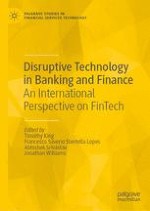2021 | OriginalPaper | Buchkapitel
2. A Historical Perspective on Disruptive Technologies
verfasst von : Rossella Locatelli, Cristiana Schena, Alessandra Tanda
Erschienen in: Disruptive Technology in Banking and Finance
Verlag: Springer International Publishing
Aktivieren Sie unsere intelligente Suche, um passende Fachinhalte oder Patente zu finden.
Wählen Sie Textabschnitte aus um mit Künstlicher Intelligenz passenden Patente zu finden. powered by
Markieren Sie Textabschnitte, um KI-gestützt weitere passende Inhalte zu finden. powered by
